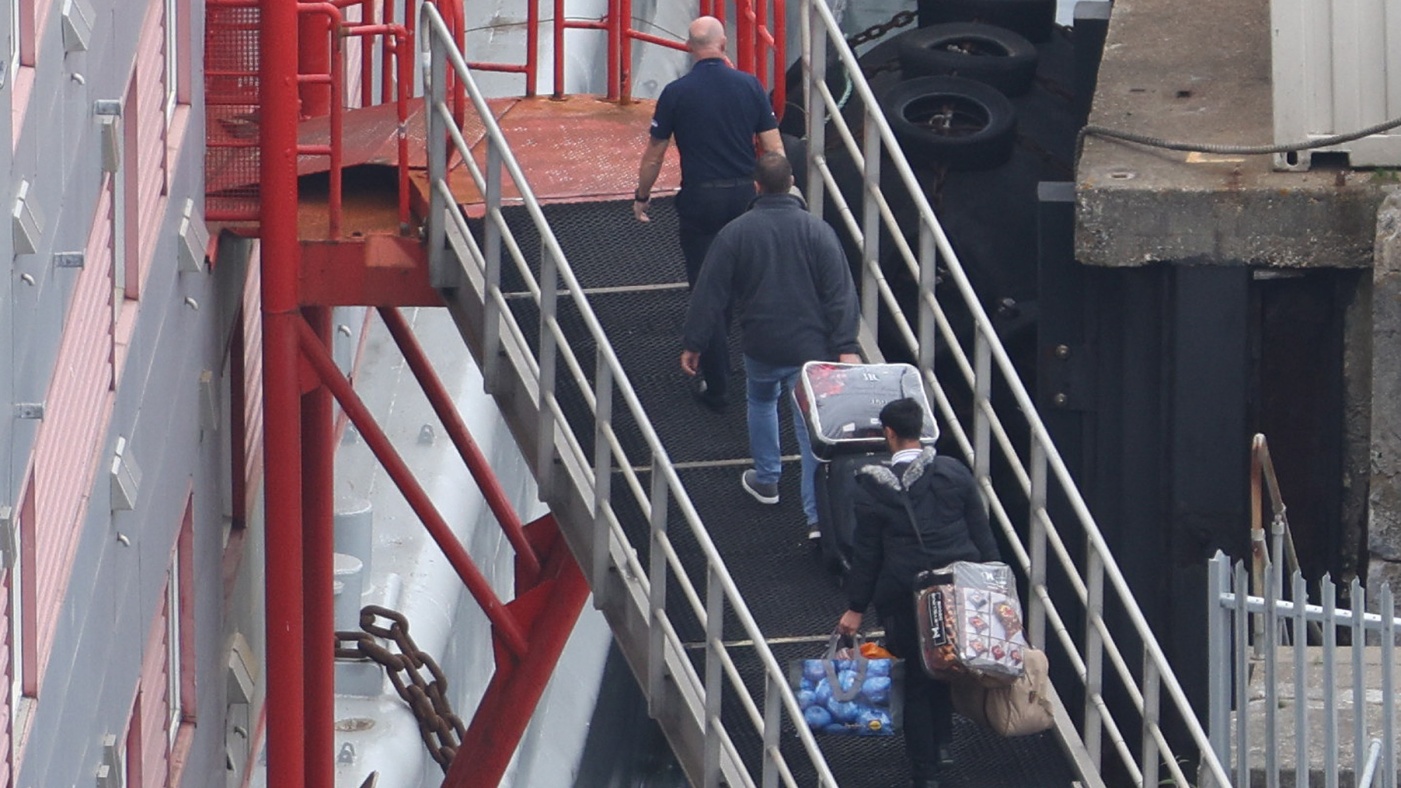Bibby Stockholm: the UK’s own Alcatraz?
The controversial accommodation barge is the first secured by the government under its plan to cut the cost of housing asylum seekers

A free daily email with the biggest news stories of the day – and the best features from TheWeek.com
You are now subscribed
Your newsletter sign-up was successful
Arriving on the Bibby Stockholm was like “entering Alcatraz prison”, according to one of the first asylum seekers to board the controversial barge.
Moored in Portland Port, Dorset, the accommodation barge is the first secured by the government under its plan to reduce the cost of asylum accommodation, which according to the Home Office, has reached £6m per day. The now-infamous barge is moored “on the same spot as a prison ship” which was used to ease overcrowding for almost a decade until 2006, reported the BBC.
‘A floating detention facility’
The first asylum seekers took up their berths on the Bibby Stockholm this week, although they could be more accurately described as “cells”, said The Guardian in an editorial, branding the Bibby Stockholm a “floating detention facility”. The government’s agenda in housing asylum seekers on barges is “nakedly political and performative”, argued the paper: removing people from hotels onto barges is not necessarily more cost effective, as the government argues, but removes the “politically awkward” perception that staying in a hotel “implies comfort”.
The Week
Escape your echo chamber. Get the facts behind the news, plus analysis from multiple perspectives.

Sign up for The Week's Free Newsletters
From our morning news briefing to a weekly Good News Newsletter, get the best of The Week delivered directly to your inbox.
From our morning news briefing to a weekly Good News Newsletter, get the best of The Week delivered directly to your inbox.
Speaking to the BBC, one asylum seeker said the “sound of locks and security checks” gave him the feeling of “entering Alcatraz prison”, and described how his roommate had “panicked in the middle of the night and felt like he was drowning”. But other asylum seekers have given the barge a more favourable review, with one telling The Sun: “It’s good. It’s normal. Food was good. Bed was good.”
The BBC, which toured the site before the first occupants arrived, said the barge had “the feel of an old overnight ferry or an outdated motel”. The barge will have 24/7 security on board, and occupants will be issued with ID swipe cards and will face “airport-style security scans to get on and off”.
But overall, it seemed to be “light, clean and…reasonably comfortable”, with some journalists believing the standard was “better than some of the hotels currently housing asylum seekers”, said the broadcaster. But conditions could soon feel “very different” with hundreds of men on board, some of whom may be there for up to nine months.
‘Neither a prison camp nor a holiday camp’
The Bibby Stockholm is not a “prison ship”, argued political commentator Paul Waugh on the i news site. Indeed, one of the “more curious” aspects to the debate surrounding the Bibby Stockholm “has been ministers’ attempts to portray the barge as some kind of prison ship to punish migrants” despite its facilities being “far from jail-like”.
A free daily email with the biggest news stories of the day – and the best features from TheWeek.com
That “confused messaging” is partly why the plan is coming under fire from both refugee groups, “who think of the barge as a punishment” and some local people “who think of it as some kind of taxpayer-funded, floating Butlin’s”. The barge is “neither a prison camp nor a holiday camp” but “emergency housing space but with the attempted symbolism of being ‘offshore’ and away from the mainland”.
With asylum processing times in the UK lagging far behind France and Germany, and the UK backlog of unprocessed asylum claims standing at around 166,000, critics have dismissed the use of the Bibby Stockholm as a political “stunt”, said Politico. It is far from a long-term solution to housing asylum seekers who are waiting for their claims to be processed: even with its 500-strong capacity, the barge will house “fewer than 1% of the 51,000 asylum seekers currently living in taxpayer-funded hotels around the country”, said the news site.
Nevertheless, the arrival of the first asylum seekers this week “marked a symbolic moment” for Rishi Sunak’s re-election campaign, as the Conservatives trail the Labour Party in the polls by 19 points: although tough immigration policies are “divisive” across the British electorate as a whole, they are undoubtedly popular among many of the crucial swing voters in Tory seats where Sunak is “struggling to cling on”.
Sorcha Bradley is a writer at The Week and a regular on “The Week Unwrapped” podcast. She worked at The Week magazine for a year and a half before taking up her current role with the digital team, where she mostly covers UK current affairs and politics. Before joining The Week, Sorcha worked at slow-news start-up Tortoise Media. She has also written for Sky News, The Sunday Times, the London Evening Standard and Grazia magazine, among other publications. She has a master’s in newspaper journalism from City, University of London, where she specialised in political journalism.